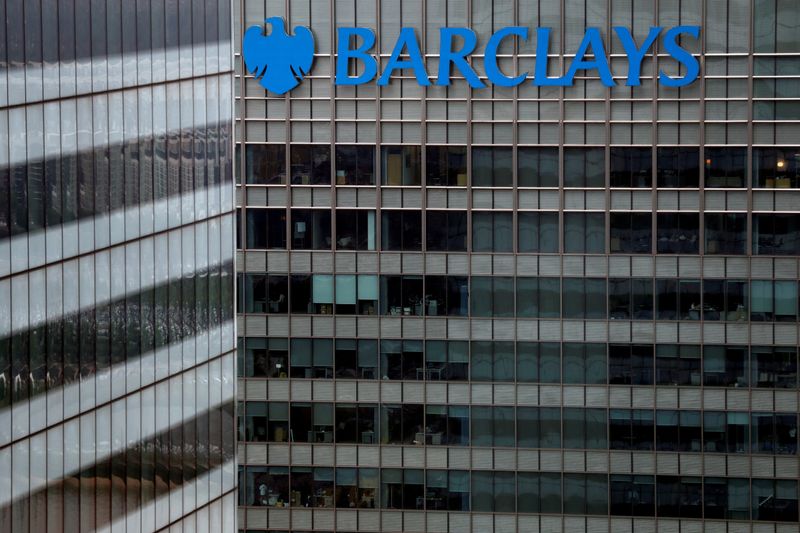By Simon Jessop and Sinead Cruise
LONDON (Reuters) -Barclays, Britain's biggest lender to the oil and gas industry, told Reuters it will stop direct financing of new oil and gas fields and restrict lending more broadly to energy companies expanding fossil fuel production.
The move, part of its Transition Finance Framework (TFF), published on Friday, follows intense pressure from campaigners over its energy policy amid an increase in climate damaging emissions from the burning of fossil fuels.
In addition, from 2025, the bank will curb broader financing to non-diversified companies such as pure-play exploration companies if more than 10% of their expenditure goes toward expanding production over the longer term.
Barclays (LON:BARC) group head of sustainability Laura Barlow said the new policy was part of its commitment to reduce emissions linked to the bank's lending and bolster finance to greener alternatives.
"It's about strengthening our focus on the energy transition," Barlow said.
Barlow said existing upstream energy clients that breach the 10% threshold would go through an enhanced oversight process that also looked at the client's investment in decarbonisation.
"It wouldn't be a red line but ... would inform our risk appetite," Barlow said.
Barclays joins banks such as HSBC (LON:HSBA) and BNP Paribas (EPA:BNPP) that are tightening oil and gas lending while pledging to increase funding to areas such as renewable energy that can help cap global warming, targeting $1 trillion in such lending by 2030.
Non-profit ShareAction, that had pressured Barclays to do more to help tackle climate change, said that in response to the new curbs it had withdrawn a proposed shareholder resolution calling for the bank to stop funding new expansion projects.
The project finance curbs are not expected to have a major impact on its business given its limited market share. The bank is not in the top 15 of major project finance banks globally, and most have yet to adopt similar restrictions.
Jeanne Martin, its head of banking standards, said the move to limit finance to expansion projects and set climate tests for all clients was good to see, although it still had concerns, including around the bank's funding of fracking.
"We have outstanding concerns ... so have made clear to the bank that we will be scrutinising the way it implements its fossil fuel policy and will not hesitate to escalate our engagement again should we be dissatisfied with ... progress," she said.
Danish investor Sparinvest, which had backed the resolution, said Barclays' policy "introduces significant new commitments" but urged "further steps, for example on short-lead time assets", Senior Portfolio Manager David Orr said in a statement.
Katharina Lindmeier, senior responsible investment manager at UK pension investor Nest, called it a "strong step forward" but said the bank "could and should" go further", including on fracking.
The bank was the biggest funder of fossil fuels in Europe between 2016 and 2022 and the second-biggest in 2022, a report by the non-profit Rainforest Action Network (LON:NETW) showed, though most of it came from corporate lending rather than project finance.
Barlow said the bank's oil and gas on-balance sheet financing as a percentage of its total lending activities was less than 2%, with capital markets financing for the sector less than 3% of total activity.
Emissions linked to Barclays' lending to the energy sector dropped 32% between 2020 and 2022, beating a target reduction of 15%, the bank said in its 2022 annual report.
Additional restrictions introduced by Barclays include no financing for exploration and production in the Amazon (NASDAQ:AMZN), and, from June 2024, no financing to firms that get more than 20% of their production from unconventional sources such as oil sands.
All Barclays corporate clients in the energy sector will be expected to present transition plans or decarbonisation strategies by January 2025, alongside 2030 methane reduction targets, and a commitment to end all non-essential venting and flaring by 2030.
The clients would also need to have near-term net-zero aligned targets for Scope 1 and 2 emissions - those linked to their own operations and energy usage - by January 2026.

Barclays' head of sustainable finance, corporate and investment bank Daniel Hanna said the bank looked at over 80 variables when assessing clients' decarbonisation plans and had committed to review 750 client entities at the last AGM.
In January, Barclays announced the formation of a new energy transition group to provide strategic advice to clients on everything from renewables to nature-based solutions and carbon capture.